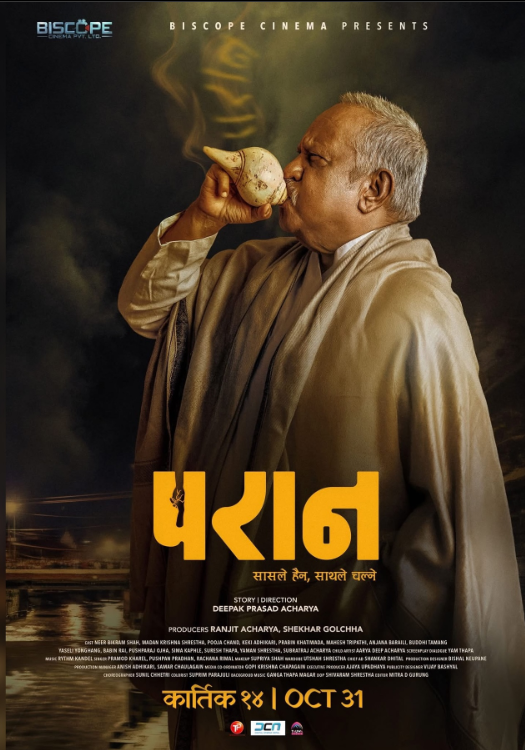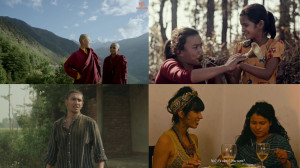Movies
‘Paran’: Emotional, but often overdone
The movie tells a father-children story while weighing the balance between family obligations and personal needs.
Sanskriti Pokharel
If you watch ‘Paran’ expecting a light family drama, the opening scene will immediately deceive you. The film opens with a colourful, high-energy celebration, and the song ‘Oye Bhanda Ni Bolena’ makes it seem like the movie will be a cheerful one.
But within minutes, the vibe shifts to emotional chaos. One second, Neer Shah (as Dharmendra) is blessing everyone with chandan in Dhankuta, and the next, his world collapses because his youngest son, played by Mahesh Tripathi, decides to move to America. This contrast between vibrant visuals and sudden heartbreak becomes the film’s biggest hook.
The wedding sequence is actually refreshing. Instead of the usual red saree palette Nepali cinema is obsessed with, Anjana Baraili stuns in yellow and Keki Adhikari in pink, and the male lead wears a patterned daura suruwal.
Post-wedding, the film indulges in Dhankuta’s beauty—tea gardens, pine-shaped trees, lush green hills, and blue skies. Neer Shah’s life is ‘slow living goals’: waking up early, gossiping with villagers, roaming around, playing cards, and ending the day with dal-bhat and contentment. His youngest son tends cows and bees. The film does a great job of making you believe this family is living the ideal slow life that every corporate employee dreams about.
But all this peace is a calm before the storm.
The youngest son, the only one still in Nepal, is not only his father’s pride but also his ointment. So when he decides to fly to the US with his wife, Neer Shah spirals. His repeated speeches about Nepal’s ‘potential’ feel relatable but outdated. This is the kind of dialogue every Nepali youth has repeatedly heard. The sentiment is fine; the repetition gets tiring.
Foreshadowing is subtle but clever here. Early on, the youngest son’s wife, played by Anjana Baraili, is driving a scooter while he sits in the back. Tiny detail, but it hints at the role she will play. She is steering her husband into places he never expected to go (literally and metaphorically). Plus, it’s a nice nod to her independence. Meanwhile, the son is emotionally tied to his father.
Neer Shah’s role is funny too, often without trying to be. He will not touch chicken because he’s Brahmin, yet plays cards, which lands him in hot water with the law. The contradictions are hilarious but also oddly relatable. In one scene, he asks a female doctor for her name, caste, and even gotra (lineage), which is absurd and socially critical. It underscores how caste identities define women’s social positions in Nepal, regardless of professional status. This offers a subtle commentary on entrenched societal norms.
Visually, the movie shines. Dhankuta looks alive and sunny during the happy family days, with blue skies and vibrant scenery. After the son leaves, everything suddenly turns grey and gloomy. The weather has its own mood swings. Cinematography like this is simple but effective. It screams “Dad’s heart is broken” without a single dialogue.
And yes, Neer Shah’s heartbreak is both sad and infuriating. He sulks, misses his son, and refuses to appreciate the care he gets from his second-born child (played by Prabin Khatiwada) and daughter-in-law (played by Keki Adhikari) in Kathmandu.
They do everything to make him comfortable. They bring him food he likes, buy him new clothes, and fuss over him. But he just sneaks back to Dhankuta without a word of thanks. His attachment to the youngest son is understandable but sometimes over-the-top, enough to make you roll your eyes.
This tension between parental expectations and personal freedom is the film’s beating heart. The youngest son is caught between devotion to his father and responsibility to his wife, highlighting the classic Nepali dilemma: how do you balance family loyalty with your life choices? The movie does a good job of showing this conflict.
The film is emotionally heavy and leans on melodrama at times, but that’s kind of the point. It is trying to show the raw, messy feelings parents have when their children move away.

Also, ‘Paran’ raises broader questions about the purpose of cinema. Should films confront reality, holding up a mirror to societal truths, or offer escapism from life’s difficulties? Those who appreciate cinematic realism will find ‘Paran’ compelling, as it portrays the emotional and social turbulence surrounding migration, family bonds, and generational expectations. On the other hand, for viewers seeking entertainment or an escape, the film may feel heavy and emotionally demanding.
Gender dynamics get a subtle nod, too. The youngest son’s wife is not merely a prop; she’s independent, confident, and proactive. The scooter scene is small but telling: she drives, makes decisions, and essentially controls parts of the family’s journey. It’s refreshing to see a female character in Nepali cinema with agency beyond just being ‘the wife’.
Humour is sprinkled in strategically. The father refusing chicken yet playing cards, or interrogating the doctor about caste, adds levity without undercutting the serious themes. These moments give the audience space to laugh while digesting heavier topics like attachment, societal expectations, and migration.
Now, about the melodrama: yes, some lines and moments feel like they were written for tears rather than realism. Neer Shah’s idealistic speeches about Nepal can feel cheesy, and a few emotional outbursts verge on overkill. You can cringe at the lines, but by the end, you feel the sadness, frustration, and love coursing through the family.
Despite some cringe-worthy moments, ‘Paran’ succeeds because it taps into universally relatable themes: parental attachment, generational tension, and the impact of migration. Every Nepali parent who has seen their child leave for work abroad will recognise bits of themselves in Neer Shah’s character. The film makes you laugh, roll your eyes, sigh, and maybe even shed a tear.
In conclusion, ‘Paran’ is a film that’s both heartwarming and frustrating. I rate this film 2.5 out of 5.
———————————————-
Paran
Director: Deepak Prasad Acharya
Cast: Neer Shah, Mahesh Tripathi, Anjana Baraili
Duration: 2 hours 26 minutes
Year: 2025
Language: Nepali




 9.89°C Kathmandu
9.89°C Kathmandu












